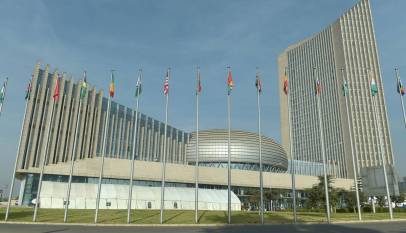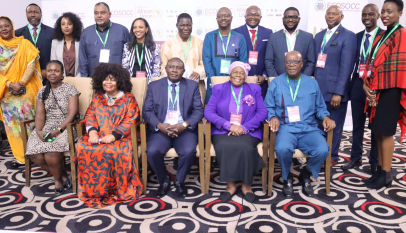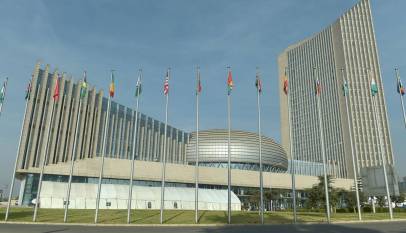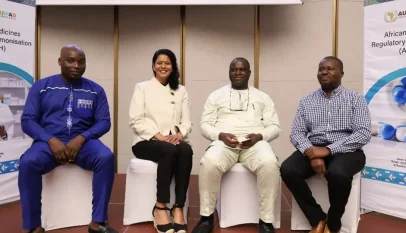NFNV Nigeria: Building African women entrepreneurs’ resilience to Covid-19
New Faces New Voices (NFNV) Nigeria last week hosted a two-day virtual regional stakeholders roundtable which brainstormed on the impact of COVID-19 on West African women entrepreneurs and cross-border traders and how they could emerge stronger from the disruption caused by the pandemic.

The New Faces New Voices (NFNV) Women in Finance Network is one of the pan-African women networks under the Graca Machel Trust (GMT) which focuses on expanding the role and influence of African women in the financial sector. Themed: “Partnership For Growth,” the stakeholders’ roundtable aimed to unlock the growth potentials for West African women in business across the entire agricultural value chain, against the backdrop of the Covid-19 pandemic.
While welcoming participants to the stakeholders’ roundtable, the country director of NFNV Nigeria cum interim president of West African Cross-border Women Traders Association (AFOACT), Aishatu Debola Aminu, said the gathering of women entrepreneurs, cross-border traders, and professional women in business and finance from across Africa aimed to explore opportunities and challenges in cross-border trade on the continent as well as amplifying the voices of women cross-border traders whom, she said, constituted a significant percentage of informal traders on the continent.
Ms Aminu said although the impact of the Covid-19 pandemic had cut across all businesses, women were particularly more vulnerable to the disruption caused by the pandemic. “We hope that this forum will stimulate discussions and examine critically the opportunities for unlocking the growth potentials in the entire value chain of the Agric sector in the region, as well as strengthen the capacity of business women on innovative ways to overcome the various challenges caused by the Covid-19 pandemic.”
In her keynote address, Ms Cecilia Akintomide, former secretary general/vice president at the African Development Bank (AfDB) cum independent non-executive director at FBN Holdings, emphasised the need for the formalization of Africa’s informal cross-border trade, which she said, formed a significant portion of informal trade on the continent. “About 60-80% of informal cross-border traders are women, it has contributed about $17-20 billion to southern Africa’s economy, generating about 20-75% of jobs,” she said.
Akintomide described the formalization of cross-border trade as an important step towards protecting women cross-border traders from the negative impact of the recent economic challenges and increased poverty levels, as well as helping women to maximize the benefits of the upcoming African Continental Free Trade Area (AfCFTA). “Informal cross-border trade can help take more people out of poverty. We must facilitate, strengthen and ensure that it is adequately formalized so as to help develop the agricultural value chain,” she added.
She decried the fact that women cross-border traders were grappling with many obstacles which prevent this form of trade from fully fulfilling the role it should play as a catalyst for economic growth and development on the continent. Akintomide said even as ECOWAS member states had adopted strategies and signed treaties in response to the numerous obstacles faced by women cross-border traders in West Africa, there were still challenges preventing the full realization of the potentials of cross-border trade in the region.
“These include lack of adequate border infrastructure; inadequate data; exposure of traders to dangers and insecurity such as attacks by armed robbers, rapists, dangerous animals etc.; limited access to finance; lack of market information; slow implementation of existing policies on cross-border trade; limited knowledge about taxes, duties and exemptions; informal fines and confiscation of goods; inconsistent and non- harmonized national laws, policies and regional instruments; as well as limited knowledge, education and business management skills,” she said.
Akintomide therefore emphasized the need for women cross-border traders to take charge by engaging policymakers; creating awareness campaigns on simplified procedures for facilitating smooth cross-border trade; promoting local language transactions; leveraging technology and e-commerce, amongst other measures critical for breaking the numerous barriers to women’s cross-border trade in Africa.
In her address, Dr Shungu Gwarinda, interim CEO cum director of programmes at the Graca Machel Trust, said the Covid-19 pandemic had adversely impacted different sources of livelihoods and particularly the livelihoods of women, whom she said predominantly work in the informal economy. Dr Gwarinda said the insignificant population of women engaged in the formal sector were in micro, small and medium enterprises (MSMEs) who also felt the shocks of the pandemic, with many of the MSMEs having either closed down or currently struggling to survive.
“Despite the barriers women entrepreneurs face, they contribute largely to the GDP and economy of the continent through their work in the informal sector which creates about 85% of employment on the continent. They also represent about 70% of the frontline workers in the Covid-19 pandemic response. About 30% of businesses in the SMEs category are owned by women, and about 70% of economically active individuals are women,” she noted.
Gwarinda thus noted the need for diverse opportunities for women to rebuild their businesses and thrive during and beyond the pandemic as well as the necessity for women business owners to acquaint themselves with the requisite information to be able to access the opportunities. She as such acknowledged the efforts of countries like Senegal, South-Africa, Egypt, Tunisia and Morocco as well as international organizations such as the World Bank, for providing economic stimulus packages to mitigate the adverse impact of the pandemic on women.
Gwarinda spoke on how a GMT initiative called the Ilizwi (the voice) was helping African women shape policy discourse on the response to the pandemic, through various intervention programmes. She said the intervention programmes were driven by a growing need for context-specific responses for mitigating the adverse impact of the pandemic; informing policymakers, Civil Society Organisations (CSOs) and the private sector on effective pathways to socio-economic recovery; as well as providing holistic response to the needs of women and children in the economy.
“We must leverage the power of our collective voices by working with relevant agencies on cross-border trade to make them respond to our needs, as well as leveraging the voices of powerful and strong women like Graça Machel, Dr. Ngozi Okonjo-Iweala, Dr. Vera Songwe, and Maria Ramos. We must also strengthen the ecosystem of our smallholder farmers through concerted efforts so that they can have access to inputs and market information; create investment in infrastructure so that women can participate in digital economy and growing technological advances; and also invest in social infrastructure.”
While speaking on the second day of the stakeholders’ roundtable, Leila Farah Mokaddem, AfDB’s resident representative in Morocco, emphasized the importance of partnerships, funding and improved access to education and skills development among women in business, as a means of bridging gender inequality. She said even as the Covid-19 pandemic had resulted in both positive and negative growth, African countries must make deliberate efforts to ensure existing jobs were preserved and made accessible to women.
Mokaddem said the AfDB was working to mainstream gender equality and women empowerment through its High 5s programme which seeks to: Light up and Power Africa; Feed Africa; Industrialize Africa; Integrate Africa; and Improve the Quality of Life for the People of Africa. “We are working on promoting an enabling human development policy environment as well as strengthening institutions that deliver basic services to improve access to quality education, health, nutrition, technology and innovation, in order to accelerate Africa’s growth and entry into higher value-added areas of production and competitiveness.”
“We know that women and girls have a huge role to play in Africa’s development, our strategy aims to increase inclusive employment and entrepreneurship, strengthen human capital, and create durable labor market linkages by undertaking interventions that catalyze private sector investment, by increasing women’s access to capital through direct and indirect debt and equity investments and reducing risks by providing guarantees and first-loss provisions for banks’ lending to SMEs, especially those owned or managed by women,” she said.
Mokaddem spoke about the launch of the Africa Gender Index report by AfDB, Economic Commission for Africa (ECA) as well as UN Women, aimed at providing governments and partners with reliable data so as to develop evidence-based reforms, track progress and evaluate the effectiveness of policies to advance gender equality. She described the report as the most comprehensive study of the state of gender equality across 51 out of 54 African countries, one that highlights the progress made in closing gender gaps in education and health, jobs and wages as well as political participation and leadership.
In her speech, Ms Lola Fadumiyo, a trade expert, said the Covid-19 pandemic’s disruption of African economies had necessitated increased cross-border trade. Fadumiyo said despite agriculture remaining a dominant source of livelihood for at least, 70% of West Africa’s population, the region was still threatened by food insecurity and increased poverty concentration among rural smallholder farmers in countries like Burkina Faso, Nigeria and Niger.
“At the country level, we need to ensure that the role of the market in supply security is not hampered and the food needs of the entire population is met. Also, at the household level, we need to analyze the role of the market in regular food supply for households both in terms of market supply and food prices, on the one hand, as well as the generation of household income through income earned from exported goods and migrant income transfers, on the other hand,” she said.
Ms Fadumiyo bemoaned the fact that although slight gains had been recorded at country levels, thanks to agricultural transformation programmes, agriculture in the ECOWAS region was yet to deliver its full potentials, in terms of delivering basic food commodities, in both quantity and product range, as demanded by the region’s fast growing population. She therefore sees the regional cross-border market space – which could be further harnessed through the AfCFTA – as crucial for achieving economic growth, improved livelihood and income generation in the region, particularly among women.
“The AfCFTA will enable West African women look beyond the region, it presents great opportunities for the agricultural and agro-processing sectors, which require a larger market to be competitive and become drivers for food security/economic growth; investment in transport and logistics; exploiting comparative advantage between member countries and ensuring a better connection between production diversity and the different diets of the population; as well as connecting market players to surplus markets and deficit markets,” she said.
The NFNV Nigeria stakeholders’ roundtable brought together women entrepreneurs and cross-border traders from across West Africa and the continent. Amongst other resolutions made by participants at the virtual convening, were the need for increased collaboration and partnerships; the need for financial institutions such as AfDB and World Bank to work more closely with African countries in the disbursement of funds; the need for technical and financial assistance from financial institutions; as well as the necessity for the establishment of a West African women cooperative, amongst others.


















